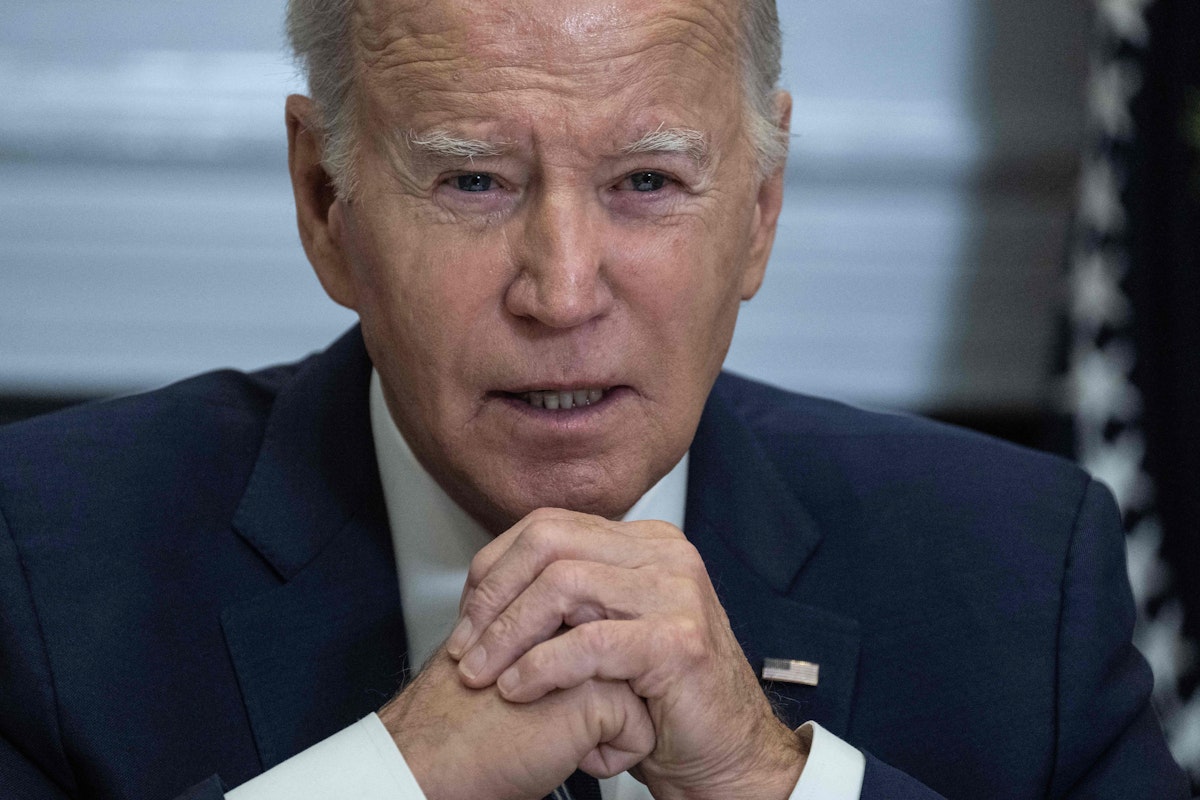The Ultimate Cost of Biden’s Refusal to Call for a Full Cease-fire in Gaza
Two months ago, buffeted by economic pessimism and concerns about his age, President Biden explained once again why he’s seeking reelection. “I’m running because democracy is at stake,” Biden told the crowd at a Democratic fundraiser. “And let there be no question, Donald Trump and his MAGA Republicans are determined to destroy American democracy. And I will always defend, protect, and fight for our democracy.”A few weeks later, Hamas launched its brutal attack on Israel, and Israel responded by bombarding and then invading the Gaza Strip—with the explicit support of the Biden administration. The president’s popularity, in the negative for more than two years now, has fallen further amid the war, and polls show that Biden’s steadfast opposition to a sustained Gaza cease-fire is largely to blame. Given his belief that a Republican victory in 2024 may spell the end of our democracy, a critical question must be asked: What U.S. interest is of such crucial importance in Israel’s assault on Gaza that it warrants risking not just Biden’s reelection but American democracy itself?The notion that the 2024 elections are existential for the country may sound alarmist, but it’s widely and genuinely believed among Democrats. Nancy Pelosi told CNN two months ago that “nothing less is at stake than our democracy in this election.… We have to prove through the night, with the certainty of this election, that our flag is still there, with liberty and justice for all, as we pledge every day.” And earlier this month, Hillary Clinton went so far as to note that “Hitler was duly elected,” adding that if Donald Trump defeats Biden next year, it “would be the end of our country as we know it.” It is precisely because of this prediction, accurate or not, that Biden’s resistance to a full-blown cease-fire—as opposed to the temporary truce Biden seeks to take credit for—becomes all the more perplexing. A series of polls have shown that Biden’s defense of Israel’s war conduct is a key factor behind his declining poll numbers, particularly among younger voters whose support proved crucial for his 2020 victory over Trump. That year, 65 percent of Gen Z voters supported Biden, which was 11 percent more than any other age group. And turnout among Gen Z and young millennials was crucial. Between 53 and 55 percent of registered 18- to 29-year-olds voted in 2020, according to the New Policy Institute’s Simon Rosenberg, who told CNBC that this “may be the highest ever recorded in the modern era of politics.” Now, the bad news for Biden: This cohort has a dramatically different view of Israel than older age groups. According to a 2022 survey by Pew Research Center, 58 percent of people aged 18 to 29 have an unfavorable view of Israel, versus 28 percent of Americans older than 65—a divergence that has only become sharper in the past few weeks. An NBC News poll released on Sunday found that between September and November, Biden’s approval rating among voters aged 18 to 34 fell from 46 to 31 percent. It’s no mystery why: A stunning 70 percent of voters in this age group disapprove of his handling of the war in Gaza. “This poll is a stunner, and it’s stunning because of the impact the Israel-Hamas war is having on Biden,” Bill McInturff of Public Opinion Strategies told NBC.More bad news for Biden: Young voters tend to be loyal not to a party or candidate but to their preferred policy objectives, often voting on a single issue. They didn’t vote for Biden in 2020; they voted against Trump, more specifically his policy agenda. They weren’t excited about Biden, but their lack of enthusiasm about him as a person “didn’t really dissuade the generation from coming out and voting for Democrats,” pollster John Della Volpe of Harvard University told The Atlantic.At first glance, this may sound favorable to Biden, who is surely hoping that young voters will back him again out of fear of Trump’s agenda. But if these voters’ sentiments toward Biden turn negative from neutral as a result of his stance on Gaza, a considerable amount of the Trump-repellent effect may be neutralized, resulting in a considerable portion of young voters either supporting a third-party candidate or sitting the election out. Faced with two candidates whose agenda they oppose, many Gen Zers will simply stay home. And those who do vote next year may break evenly for Biden and Trump. As The New York Times’ Nate Cohn noted on Monday, “Virtually every poll shows a close race … among young voters.”So far, there is no evidence that the temporary cease-fire and prisoner swap brokered by Qatar have reduced Gen Z voters’ anger with Biden. Of course, much can change between now and November. There will be more crises in the months to come, and the current ones may fade. Crucial issues for young voters, such as abortion rights, will come back to the fore. Biden’s campaign is surely counting on it. Then again, the war in Gaza could still be ongoing next fall, or Israel may well be occupying Gaza

Two months ago, buffeted by economic pessimism and concerns about his age, President Biden explained once again why he’s seeking reelection. “I’m running because democracy is at stake,” Biden told the crowd at a Democratic fundraiser. “And let there be no question, Donald Trump and his MAGA Republicans are determined to destroy American democracy. And I will always defend, protect, and fight for our democracy.”
A few weeks later, Hamas launched its brutal attack on Israel, and Israel responded by bombarding and then invading the Gaza Strip—with the explicit support of the Biden administration. The president’s popularity, in the negative for more than two years now, has fallen further amid the war, and polls show that Biden’s steadfast opposition to a sustained Gaza cease-fire is largely to blame. Given his belief that a Republican victory in 2024 may spell the end of our democracy, a critical question must be asked: What U.S. interest is of such crucial importance in Israel’s assault on Gaza that it warrants risking not just Biden’s reelection but American democracy itself?
The notion that the 2024 elections are existential for the country may sound alarmist, but it’s widely and genuinely believed among Democrats. Nancy Pelosi told CNN two months ago that “nothing less is at stake than our democracy in this election.… We have to prove through the night, with the certainty of this election, that our flag is still there, with liberty and justice for all, as we pledge every day.” And earlier this month, Hillary Clinton went so far as to note that “Hitler was duly elected,” adding that if Donald Trump defeats Biden next year, it “would be the end of our country as we know it.”
It is precisely because of this prediction, accurate or not, that Biden’s resistance to a full-blown cease-fire—as opposed to the temporary truce Biden seeks to take credit for—becomes all the more perplexing. A series of polls have shown that Biden’s defense of Israel’s war conduct is a key factor behind his declining poll numbers, particularly among younger voters whose support proved crucial for his 2020 victory over Trump. That year, 65 percent of Gen Z voters supported Biden, which was 11 percent more than any other age group. And turnout among Gen Z and young millennials was crucial. Between 53 and 55 percent of registered 18- to 29-year-olds voted in 2020, according to the New Policy Institute’s Simon Rosenberg, who told CNBC that this “may be the highest ever recorded in the modern era of politics.”
Now, the bad news for Biden: This cohort has a dramatically different view of Israel than older age groups. According to a 2022 survey by Pew Research Center, 58 percent of people aged 18 to 29 have an unfavorable view of Israel, versus 28 percent of Americans older than 65—a divergence that has only become sharper in the past few weeks. An NBC News poll released on Sunday found that between September and November, Biden’s approval rating among voters aged 18 to 34 fell from 46 to 31 percent. It’s no mystery why: A stunning 70 percent of voters in this age group disapprove of his handling of the war in Gaza. “This poll is a stunner, and it’s stunning because of the impact the Israel-Hamas war is having on Biden,” Bill McInturff of Public Opinion Strategies told NBC.
More bad news for Biden: Young voters tend to be loyal not to a party or candidate but to their preferred policy objectives, often voting on a single issue. They didn’t vote for Biden in 2020; they voted against Trump, more specifically his policy agenda. They weren’t excited about Biden, but their lack of enthusiasm about him as a person “didn’t really dissuade the generation from coming out and voting for Democrats,” pollster John Della Volpe of Harvard University told The Atlantic.
At first glance, this may sound favorable to Biden, who is surely hoping that young voters will back him again out of fear of Trump’s agenda. But if these voters’ sentiments toward Biden turn negative from neutral as a result of his stance on Gaza, a considerable amount of the Trump-repellent effect may be neutralized, resulting in a considerable portion of young voters either supporting a third-party candidate or sitting the election out. Faced with two candidates whose agenda they oppose, many Gen Zers will simply stay home. And those who do vote next year may break evenly for Biden and Trump. As The New York Times’ Nate Cohn noted on Monday, “Virtually every poll shows a close race … among young voters.”
So far, there is no evidence that the temporary cease-fire and prisoner swap brokered by Qatar have reduced Gen Z voters’ anger with Biden. Of course, much can change between now and November. There will be more crises in the months to come, and the current ones may fade. Crucial issues for young voters, such as abortion rights, will come back to the fore. Biden’s campaign is surely counting on it. Then again, the war in Gaza could still be ongoing next fall, or Israel may well be occupying Gaza at that point—which a majority of young voters are almost certain to oppose too.
But it’s not just young voters Biden has to contend with on this issue: 68 percent of all voters favor a cease-fire in Gaza, versus the 31 percent who support sending Israel weapons. And yet Biden continues to refuse to call for an enduring cease-fire. The expectation in the White House is that after the prisoner swap, Israel will resume its bombardment of Gaza. Earlier this month, Biden published an op-ed in The Washington Post unequivocally supporting Israel’s invasion of Gaza based on the belief that somehow this time will be different, that an even more aggressive military response by Israel can somehow break the cycle of violence. “As long as Hamas clings to its ideology of destruction, a cease-fire is not peace,” Biden wrote.
Certainly, it is understandable that Israel wishes to defeat Hamas. There is, however, little evidence that a military-centric strategy can achieve that objective, particularly since Israel is loath to address, let alone remedy, the root causes of its conflict with the Palestinians by nonmilitary means. But given that Hamas poses no direct threat to the U.S.—unlike Al Qaeda or ISIS, who pursued universalist agendas and directly targeted America—and the heightened risk of a regional war that could pose such a threat, the U.S. cost-benefit analysis appears dangerously out of whack.
A senior Arab official recently told me that Biden has done more damage to America’s standing in the region than George W. Bush did with his illegal invasion of Iraq—a stunning statement. And the damage is not limited to America’s prestige and credibility in the Middle East. Biden has put the final nail in the coffin of the so-called Rules-Based International Order, Shivshankar Menon, India’s former national security adviser, told me.
Indeed, the idea that American leadership holds the world together, as Biden claimed a few weeks ago, has never sounded more tone-deaf.
All of these costs and risks, but to what end? That question is rarely asked—let alone answered—when our leaders commit American blood, treasure, and standing to foreign wars. Instead, they hide their failure to identify clear American interests behind lofty yet meaningless slogans about how, as Biden put it in his op-ed, “the world looks to us to solve the problems of our time.” But rarely have they disregarded these costs to American interests so blatantly when, in their own words, American democracy has been at stake from within. That’s the new ground Biden will be breaking if he continues to resist a sustained cease-fire.



